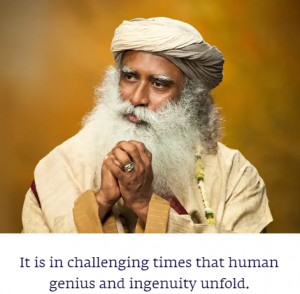Wake up early before sunrise
Get more details why you should wake up at 4am – 5:30am – click HERE >>
Do all successful people wake up at 4 am? Well, our Ayurveda taught this long ago
The ideal time to wake up is 45 minutes before sunrise, when you actually go to bed.
Wake up early before sunrise

The idea to wake up early derives from Ayurveda.
All successful people get up early.
Here Sadhguru gives us two easy tips to practice every night to get deep sleep, complete relaxation, and thus waking up early without a alarm.
Wake up early before sunrise
Wake up at 5 am only if you have a goal, discipline, can resist social distractions
and learn how to go to bed at 10 pm.
According to our Ayurveda, the ideal time to wake up is before 45 minutes of sunrise, which is also known as the Brahma muhurta.
A great shift of energy takes place at that time.
This is the ideal time for attaining Brahm gyan. Of course, if you don’t open your eyes to the screen of your mobile phone. Ayurveda tells you to do some meditation, exercise and prayers instead.
Well, we are not that ambitious.

Plan your day accordingly. (Photo: Twitter)
But, as it seems, the claim of the successful people can’t just be junked. They must have read a page or two from our Ayurveda, which tells us that there is a reason why newborns wake up and start crying at the crack of dawn, because all our bodies are attuned to that natural clock, dictated by nature — waking up at sunrise, going to bed at dusk. (Not possible at all).
As we grow up, we eventually wrest this control from nature and pass it on to board examinations, projects, assignments, Netflix and chill, cups of coffee, social media, long phone calls, etc.
So, we are actually going against our natural clock — and that’s why we are suffering from many “avoidable ailments”.

Pitta hour: Where is our productivity going? Well, here! (Photo: Reuters)
Explaining a little more in a simple way — Ayurveda tells us about three doshas, which are biological energies found in our body and mind: Vata (space and air), Pitta (fire and water) and Kapha (water and earth). A day is divided among these three doshas.
Early morning (not by your definition, but by Ayurveda, which is 4 am to 5.30 am) is dominated by Vata, which governs body movement, flexibility, mental activities, etc. So, if you wake up at that time, you will get these advantages. Again, waking up does not mean opening your eyes and going through social media feeds. In this extraordinary case, waking up means getting out of bed and doing something — if not running like Usain Bolt, at least performing some household chores.
The Kapha dosha starts from 6 am — this dosha is marked by its heaviness. So, if you wake up after 6 am, Ayurveda tells that you are bound to feel heavy and slow throughout the day.
Then comes the Pitta dosha, marked by productivity. No wonder we feel so productive between 10 pm to 2 am, and watch all our series episodes at one go — while we must be active between 10 am and 2 pm, when we basically sulk at traffic and then at office.
The Pitta time at night is also for productive activities, but not externally, says Ayurveda. Instead, internal activities should take place then.
All this unsolicited knowledge must spoil your weekend.
Go to bed early today.
Rosalind Gardner Super affiliate Handbook
This is the Amazing True Story of a Woman who, with NO business experience became

a Super Affiliate earning $500,000+ per year selling other people’s stuff online.
Download the Rosalind Gardner’s Super Affiliate Handbook – here >>

